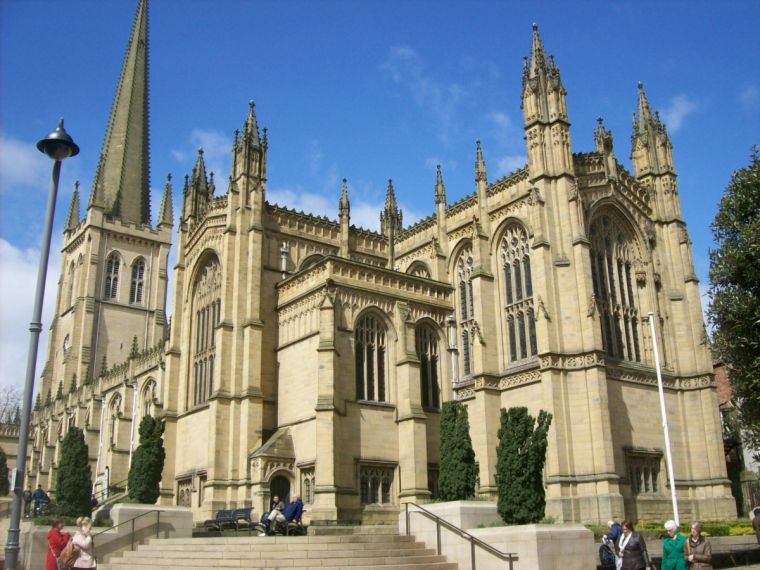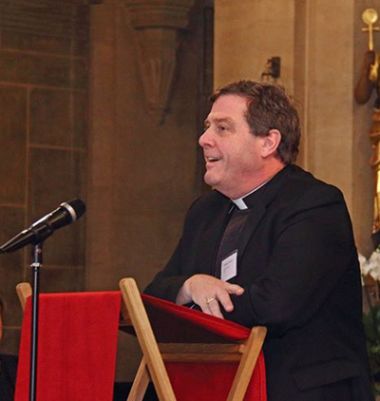Wakefield and women's ministry: CofE's reviewer finds against cathedral
How far should a cathedral committed to the equal ministry of men and women go in accommodating faithful Anglicans who don't agree? A report by the Church of England's independent reviewer into Wakefield Cathedral has concluded that it didn't go far enough – and the Bishop of Wakefield agrees.
The report by Sir William Fittall was initiated after a member of Wakefield's congregation, Dennis Belk, complained that the cathedral had ceased publicising in advance the names of those who were to celebrate Holy Communion. Belk, who does not believe women should be priests, relied on the information to know when he could take communion and said he had had three times to leave services when he found a women was to be the celebrant.

The Church of England has set down 'Five Guiding Principles' on the ministry of women, one of which is that it remains committed to enabling those who do not accept women as priests or bishops to 'flourish within its life and structures'. In his letter to the then independent reviewer, Sir Philip Mawer, Belk said the decision by the cathedral's dean, Very Rev Simon Cowling, had made it 'almost impossible' for him to 'flourish' as a traditional Catholic. He said: 'I do not force my convictions on others, as I defend their right to rejoice in the ministry of women. I do not, however, deserve to be marginalised in this way.'
He had previously written to the dean saying the decision to omit the information 'causes me great distress' and suggesting the information be included on the weekly service sheet.
Cowling said in reply: 'Removing the names of those – male and female – who are to preside at a particular service helps to make the point that it is our offering of the Eucharist that is central, rather than the particular individual who is presiding.'
He added that 'all the clergy at the cathedral – male and female – will continue to offer you a warm welcome' and 'your prayerful presence at the Eucharist will be valued whether or not you feel able to receive communion'. Belk also wrote to the Bishop of Wakefield, Rt Rev Tony Robinson, appealing to the Five Guiding Principles and saying: 'I certainly do not think I will "flourish" by merely abstaining from receiving the sacrament on those occasions when a woman presides.'
Robinson replied that he understood and shared Belk's concern, saying: 'I therefore share your disappointment at the decision that has been taken at Wakefield Cathedral. Unfortunately the Dean and Chapter seem determined to carry on with the new practice.'
In his report released today, however, Fittall – Mawer's successor – has come down in favour of Belk and the bishop. After a careful analysis, he says cathedrals have a responsibility to 'contribute to the mutual flourishing of both the majority and the minority', adding: 'The problem is that the foreseeable effect of the policy is precisely to increase the greater separation that the Dean says that he wishes to avoid.' It was 'asking too much' of someone in Belk's position to turn up to a communion service without knowing whether or not he would be able to receive.
While Fittall has no authority to compel the cathedral to publish names in advance, he said they should be 'supplied with a good grace' to anyone who asks for them. 'Reciprocity and mutuality mean that the majority and minority need to avoid putting stumbling blocks in the way of each other or giving offence,' he concludes.

His report was welcomed by traditionalist Anglican group Forward in Faith – whose chairman is the Bishop of Wakefield.
It said in a statement: 'As Sir William says, "The Church of England... has committed itself to enabling the minority to flourish within its life and structures. Denying brothers and sisters in the Body of Christ information which is not intrinsically confidential and which they need in order to act consistently with their theological conviction tends to undermine that commitment."
'A generous and Christ-like approach would be to go the extra mile and make such information available without waiting to be asked. That would help to make Wakefield Cathedral a truly inclusive church.'
Robinson told Christian Today: 'I hope the cathedral will go along with these recommendations.' He added: 'It is mainly about being generous.'
Cowling told Christian Today: 'I am grateful to Sir William for the time and care he has taken over his report. I shall be reflecting on his conclusions with colleagues on Chapter.'











